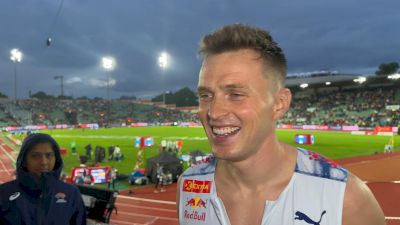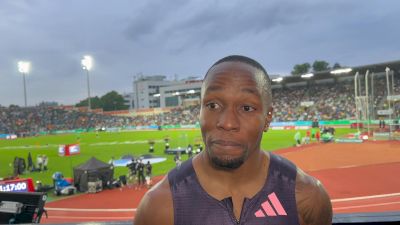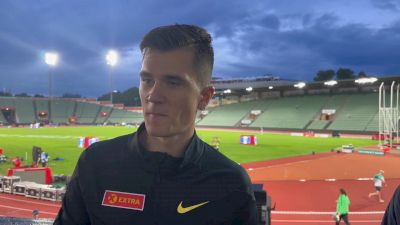With Crazy Moments and Races, The Bislett Games Did Not Disappoint
With Crazy Moments and Races, The Bislett Games Did Not Disappoint
On Thursday in Oslo, a series of fantastic races and events paved a wave for an exciting Bislett Games, the sixth Diamond League meeting.

It was a night of surprise performances at Bislett Stadium in Oslo.
Hagos Gebrhewit came within two seconds of the world record in the 5K, Karsten Warholm was chased down by Alison dos Santos in the 400mH and in the 1,500m, Jakob Ingebrigtsen was pushed to the line by an old rival, all of it happening on Thursday at the Bislett Games.
In the women’s 3K, Australia’s Georgia Griffith won and stole Jess Hull’s Oceanic record.
- Subscribe To FloTrack To Watch More Track & Field Meets All Year Long
- Catch all Prefontaine Classic Coverage on FloTrack
- A sold out crowd expected for the Bislett Games in Oslo
- Watch The Diamond League Live On FloTrack, Starting In 2025
Matthew Hudon-Smith of Great Britain ran a strong 44.07 to shave almost two-tenths off his own European record.
The Bislett Games in Oslo is coupled with the Bauhaus Games in Stockholm on June 2 to conclude the early season this Olympic year.


The sold-out crowd at Bislett Stadium may have led to Karsten Warholm’s undoing in the 400mH. The raucous spectators guided him to his characteristically dominant first half of the race, but with three hurdles remaining, the cracks began to show.
Alison dos Santos ran a measured race to cross the finish line first and deliver a painful defeat at home.
Dos Santos’ 46.63 just edged out America’s Rai Benjamin’s world lead of 46.64.
Meanwhile, Warholm’s 46.70 was a bit slower than his winning time of 46.52 last year. Counting just a few races between them, these three men are all under Kevin Young’s previous world record of 46.78.
The event is definitively in a new era, and if this triad stays healthy, the only question is how the Olympic medals will be distributed.
Australia’s Georgia Griffith Continues Her Breakout Season
In the Xiamen Diamond League on April 20, 27-year-old Georgia Griffith ran 3:59.04 to improve her 4:00.16 best from 2022. Even though she broke a notable barrier, the performance was overshadowed by her having placed sixth in the race.
Perhaps sub-4 in the 1,500m isn’t what it once was.
Coming into Oslo, Griffith wasn’t mentioned in predictions. The sentiment was that if an Australian was to chase the 8:25.01 wave lights set at meet record pace, that Australian would be named Jessica Hull.
Hull already owned the Oceanic record of 8:24.39.
But showcasing her 1,500m closing speed and a massive increase in fitness, Griffith began to move up before 200m and made a decisive move with about 150m to go. She won in 8:24.20, improving the Oceanic record and Beatrice Chebet’s meet record.
Ethiopian Likina Amebaw went with her and ran 8:24.29. Amebaw has shown a stupefying improvement between 2023 and 2024, going from a complete unknown focused on the roads to a track star who could conceivably challenge the country’s best at 1,500m or 5,000m.
Her track 5K has improved by almost a minute, from 15:37 to 14:44. Her road 10K has improved by almost two minutes, going from 31:54 to 29:56. Both of these women will be ones to watch through the rest of the season.
It’s hard to call an 8:25.82 for third a loss for Hull. She put herself in a position to win and came up short. She was close to her 3K PR just four days after running a fantastic 3:55.97 1,500m in Eugene. Hull is now an outside medal threat in the Olympic 1,500m, should she qualify for the final.
Having world class 3,000m fitness should boost her chances of getting there.
This race was filled with personal best performances. Behind Hull, there were nine PBs. Dutchwoman Maureen Koster, at age 31, ran what might be considered the performance of her career. She finished fourth in 8:26.30, clipping almost 10 seconds from her PR from last year. She’s now second on the Dutch all-time list behind Sifan Hassan.
Norwegian Karoline Grøvdal finished behind her in a national record of 8:27.02, which represented a 6.45 second PR. It was predictable that this race might have been assembled and paced to help Grøvdal break 8:30, but superior fitness goes a long way. She’ll surely be competing at Euros next week.
Also notable, Finland’s Nathalie Blomqvist set a national record with an 8:32.23 while Japanese runner Nozomi Tanaka ran a national record in 8:34.09.


There has been a dearth of sub-10 performances in the men’s 100m so far this season.
The 100m in Oslo promised to be a race that put the sprinting world on notice, but, unfortunately, a light rain started falling before the race. The track was a bit damp by the time the gun went off.
Akani Simbine ran a great 9.94 to scare the world lead. He dragged the Japanese runner Abdul Sani Brown to a 9.99.
Three other runners, including defending Olympic champion Marcell Jacobs, ran 10-point, but questions abound.
Hagos Gebrhiwet Runs 12:36.73 to Lead Eight Men Under 12:50 in the 5K
The requested meet record pace of 12:41.73 seemed like a rip-off of the USATF LA Grand Prix’s 5K, which occurred on May 17. Eleven men went under 13 minutes there.
With a larger and higher-quality field in Oslo, there was a great opportunity for somebody to establish a world-leading time.
Well, after covering first two miles in roughly 4:04 and 4:07, Hagos Gebrhiwet had enough juice to thrust himself into the world No. 2 time of 12:36.72, 13 men total went under 13 minutes, and, amazingly, eight men went under 12:51.
You read that correctly: the top eight men in this race would have defeated Selemon Barega, who ran 12:51.60 to win in LA.
Combing through the Oslo and LA meet results reveals that the men’s 5K this year is incredibly complicated–a separate article is necessary to capture all of the implications here.
The quick takes here are that:
- Americans Grant Fisher, Cooper Teare and Cole Hocker had two weeks to celebrate three solid 5K performances in LA. Now it’s back to the age-old question: how can the Americans medal if the Olympic final is a time trial?
- Luis Grijalva (12:50.58) and Dominic Lobalu (12:50.90) keep improving and are established as outside medal threats.
- Sweden’s Andreas Almgren had a massive night, improving his PR from 12:59.82 to 12:50.94. It won’t be smooth sailing at Euros, though, as Spain’s Thierry Ndikumwenayo improved from 12:55.47 to a ridiculous 12:48.10. Ndikumwenayo, Lobalu, and Almgren are now 2nd, 5th, and 6th on the European all-time list.
- Joshua Cheptegei has a lot of work to do if he wants to medal in the 5k at the Olympics this year.
Mykolas Alekna Breaks Father’s Meet Record While Rest of Field Looks On
Lithuania’s Mykolas Alekna is on top of the world. He started his season with a monstrous world record throw in the discus, which saw the instrument fly 74.39m–in especially windy conditions.
Entering the Diamond League circuit, the prevailing thought was that anyone who consistently beat Aleka could probably have also thrown for the world record, on the right day and the right conditions in Oklahoma.
What’s happened instead is that Alekna has solidified his spot as the world’s best. With a 70.91m throw in Oslo, he gained his fourth consecutive win of the season.
Adding to this, he broke his father Virgilijus Alekna’s meet record of 70.51m from 2007.
It was not an exaggeration to call the field in Oslo “stacked.” This said, Alekna’s closest competitor was Australia’s Matthew Denny who threw just 67.61m.


It’s fun to spin threads about the possibilities surrounding Jakob Ingebrigtsen races.
When the races happen, though, all of these threads dissolve–the races almost always come down to Jakob and the “next guy” dueling on the home stretch.
At the Bislett games, a jet-lagged Ingebrigtsen dueled Timothy Cheriyuout in what was one of the most dramatic races of his career. The crowd noise was deafening as the two old rivals broke away.
Ingebrigtsen held the rail into the home straight while Cheriyuout pulled up to match him stride for stride. In the final meters, Cheriyout appeared to inch past him and Jakob dove across the finish line.
He remained on the ground for a while, unsure if his move was enough to overcome the runner most often associated with having a “forward-leaning gait,” unsure if the move had been purely voluntary.
When Ingebrigtsen was announced the winner in a world-leading 3:29.74, the crowd erupted.
Cheriyuout’s 3:29.77 fulfilled a pre-race prediction. Though it must have been painful to come within centimeters of beating Ingebrigtsen on his home turf years after being written off as one of his contemporary rivals, Cheriyuout is, ostensibly, back.
Norwegian Narve Nordås did not challenge for the lead at any point and he finished way back in a disappointing 3:34.86. Stewie McSweyn, looking for an “indicator” of whether he should focus on the 1,500m or 5,000m, was either nursing an illness or he received the clearest indicator yet that the 1,500m, which he’s only run 3:36.37 for so far this year, should be second to the 5K.
For both of these formerly sub-3:30 men, it’s hard to see them reaching an Olympic final at their current fitness.
Azedinne Habz delivered a solid kick which earned him third in 3:30.80. Isaac Nader ran out of steam in the final meters but came away with fourth and a sub-3:31 PR of 3:30.84.
The other boys from the Commonwealth, Great Britain’s Elliot Giles (3:31.06) and George Mills (3:31.57) and Australia’s Olli Hoare (3:31.08), finished 5-6-7, all with season bests.
FloTrack Is The Streaming Home For Many Track And Field Meets Each Year
Don’t miss all the track and field season action streaming on FloTrack. Check out the FloTrack schedule for more events.
FloTrack Archived Footage
Video footage from each event will be archived and stored in a video library for FloTrack subscribers to watch for the duration of their subscriptions.
Join The Track & Field Conversation On Social
- Follow us on Twitter @FloTrack
- Follow us on Instagram @flotrack
- Follow us on TikTok @flotracktv
- Watch us on YouTube
- Like us on Facebook